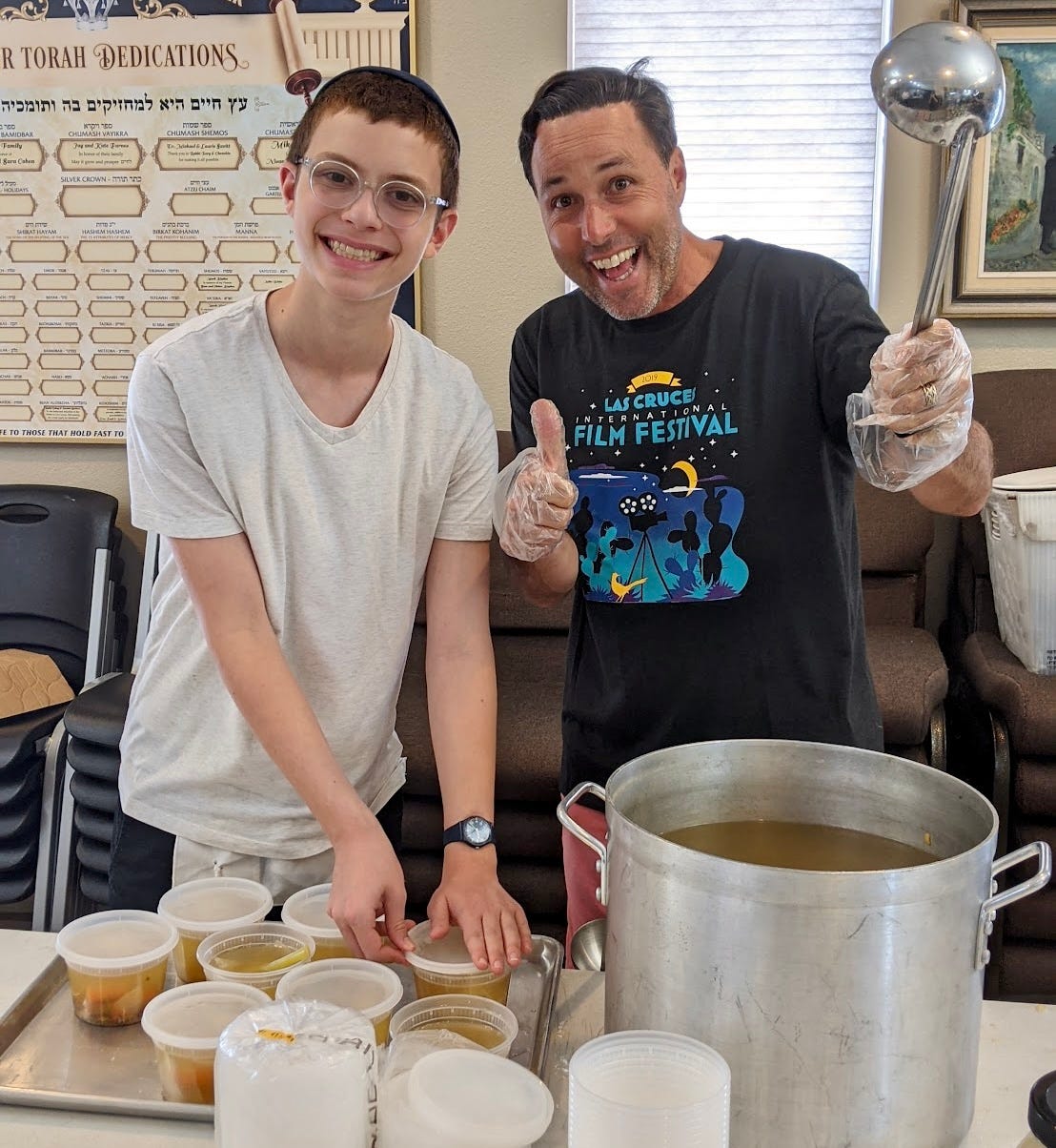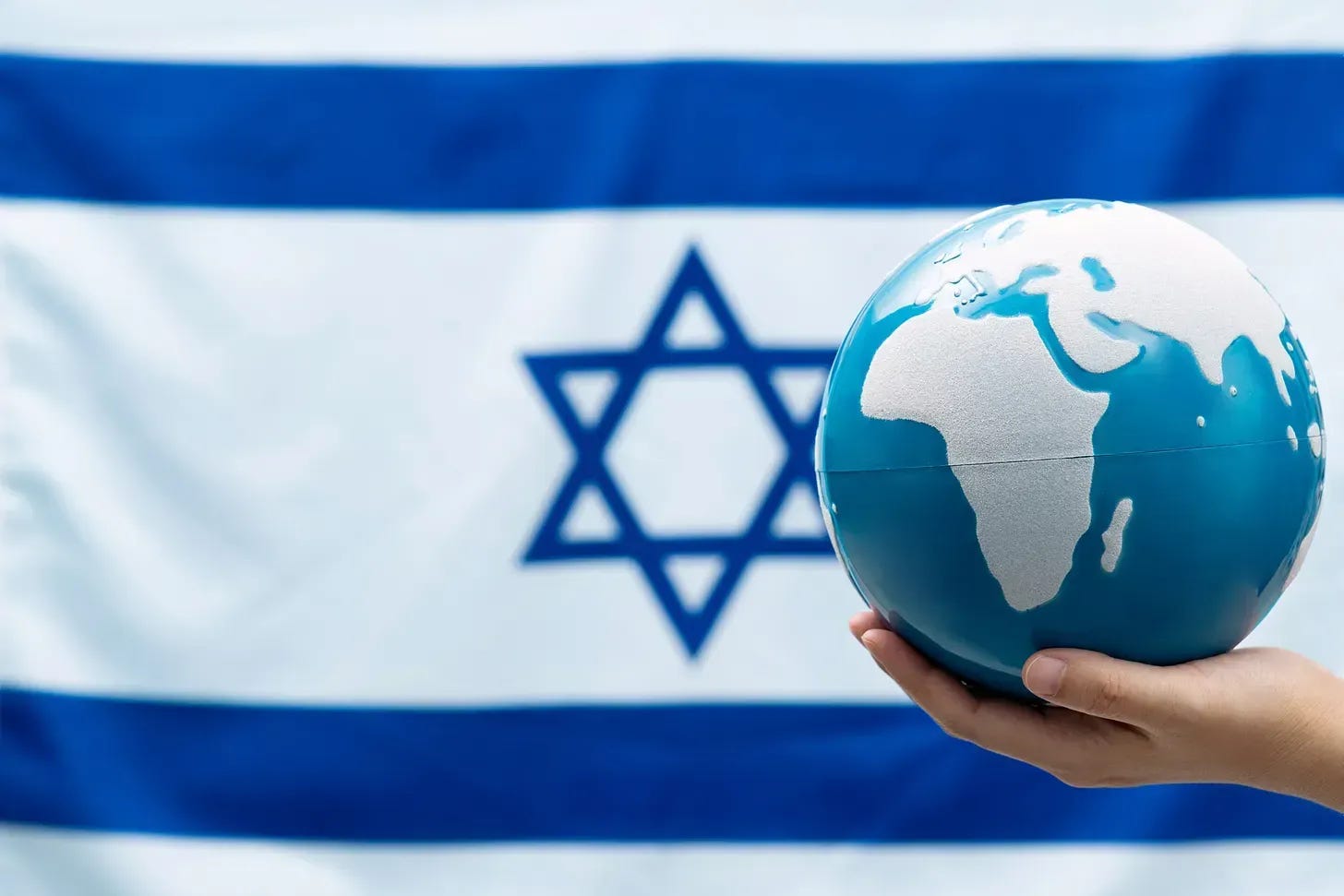A Thriving Shtetl in the American Desert
"I always tell my Jewish friends and family that if they want a new way to experience Judaism in all of its rich, vibrant glory, come to Las Cruces and visit our Chabad. Anytime. The doors are open."
By Ross Kagan Marks
When I moved to Southern New Mexico from the Chicago suburbs in 2007, I thought I was going to have to mourn the loss of my vibrant, hometown Jewish community. The area where I grew up and lived on the North Shore was predominantly Jewish. The town we moved to in New Mexico barely had any Jews. But over time, I watched the Jewish community in my new hometown of Las Cruces, New Mexico grow and thrive. In fact, in some ways it surpassed that of any Jewish community I have ever lived in, including Chicago and Los Angeles.
How is that possible? How does a Jewish population of 1,000 — in a town of 100,000 in the southwestern desert — more than triple in size and spirit in such a relatively short period of time? Rabbi Bery and Rebbetzin Chenchie Schmukler and their family — that’s how. They are the perfect example of what an enormous impact just two people can have on a small Jewish community.
This young couple and their synagogue have offered so much to me and my family, not just in terms of Judaism, but in terms of life. Two of my three children are now working for a Jewish temple, and my middle son earned his Master’s Degree in Jewish Studies from Hebrew University in Jerusalem. In us, and so many other families, they have fostered an intense love of the Jewish religion.
How did the Schmuklers do this? It goes beyond the incredibly hard work they have put in for 15 years. Each of them radiates that special “it” quality that just draws people to them. Very few folks have that. Working as a director, I have met and collaborated with some of the biggest names in Hollywood, including three Academy Award-winning actors. They all had that rare charisma, that presence of something special. It’s hard to describe, yet so easy to feel.
Rabbi Schmukler and his wife Chenchie are part of Chabad-Lubavitch, a Hasidic Jewish movement known for its outreach, education, and social service. It was founded in the late 18th century in Russia by Rabbi Schneur Zalman of Liadi. The name "Chabad" is an acronym for the Hebrew words for wisdom, understanding, and knowledge, reflecting the movement's emphasis on intellectual study and spiritual growth.

Our Chabad of Las Cruces most certainly reflects these values, offering classes in Jewish studies multiple times a year. Taught by Rabbi Schmukler, these incredibly popular classes can exceed 100 students. In fact, my very own parents have traveled to Las Cruces all the way from the Midwest to experience what they call “the best Jewish community on the planet.”
Chabad-Lubavitch is known for bringing Jewish teachings and traditions to Jews around the world, regardless of their level of observance. Chabad centers, known as “Chabad houses,” can be found in over 100 countries, offering services such as holiday celebrations, classes, counseling, and kosher food.
Chabad of Las Cruces started in 2009 in the Schmuklers’ dining room. It was a small Sukkot celebration with fewer than 20 people, five of whom were the Las Cruces Marks family. Fast forward to 2024, Chabad of Las Cruces now has its own temple that spans 4,000 square feet. The Sukkot event draws over 300 people. The congregation has already outgrown its space, and the Schmuklers are now looking to expand the building or find a bigger one to properly accommodate all of their congregants.
The Chabad movement is also involved in humanitarian and social service activities, such as providing support to those in need, assisting with relief efforts, and promoting education. When COVID hit, Chabad of Las Cruces was there, making and delivering Passover meals to hundreds of Jews in Las Cruces and El Paso. My family and I helped the Schmukler family to prepare and hand deliver over 300 of them. I still have coleslaw stains on my favorite tennis shoes.
Chabad-Lubavitch has a significant impact on Jewish life and outreach, attracting followers and supporters from diverse backgrounds and affiliations. Its teachings and practices emphasize love and acceptance, community engagement, and the importance of Jewish continuity and tradition. The Schmuklers personify all of these facets. Rabbi Schmukler always talks about being “a light for the community.” He has motivated me and my family to be better Jews, to embody that light by being good to all people each and every day. They have created a shtetl in the desert that continues to grow and thrive — to elevate not just the Jews in Las Cruces, but the whole town.
The word “shtetl” is a Yiddish term used to describe a small Jewish town or village in Eastern Europe, particularly in the areas of modern-day Poland, Russia, Ukraine, and Belarus. These towns were typically rural and had a predominantly Jewish population. Las Cruces is essentially a small rural town in New Mexico.
Shtetls were characterized by their close-knit Jewish communities, where residents often knew each other and shared religious and cultural customs. The shtetl served as the center of Jewish life in Eastern Europe, providing a place for religious worship, education, social gatherings, and economic activity.
Is this really what we have in Las Cruces, New Mexico? Yes — it really is!
Chabad of Las Cruces and the Schmuklers have fostered a strong religious and cultural identity, playing a central role in the lives of all Jews in our town. They embrace and celebrate traditional Jewish holidays and customs, such as Shabbat, Passover, and Yom Kippur. They take great joy in creating communal events that are meaningful and enjoyable. Our traditional Hanukkah lighting of the menorah in downtown Las Cruces surpasses 1,000 people, including leading city officials. Chenchie serves over 1,000 latkes and jelly donuts during the Festival of Lights.
Chenchie Schmukler just might be the best cook in town (even setting aside my personal bias). She specializes in all Ashkenazi delicacies: stuffed cabbage, brisket, gefilte fish, white fish salad — authentic dishes that are not easy to find in Las Cruces. Unless you are at the Chabad House.
The shtetl way of life came to an end with the upheavals of the 20th century, including World War II and the Holocaust, which decimated Jewish communities in Eastern Europe. Many shtetls were destroyed during the war, and survivors emigrated to other parts of the world, including the United States, Israel, Western Europe, and yes, New Mexico.
Today, the shtetl holds a place in Jewish memory as a symbol of a lost world where Jewish culture, traditions, and community thrived for generations. Yet the shtetl exists right here in my adopted hometown. The Chabad of Las Cruces ensures this is the case by celebrating and honoring Judaism as a testament to the deep history and heritage of its people.
I am constantly telling my Jewish friends and family that if they want a new way to experience Judaism in all of its rich, vibrant glory, come to Las Cruces and visit our Chabad. Anytime. The doors are open. It may not be quite as profound a trip as it is to travel to the Jewish homeland — but that doesn’t mean it can’t be transformational. I know, because it happened to me. It is still happening to me.
Thank you, Rabbi Bery and Chenchie!
ROSS MARKS is a writer, producer and director who teaches film at New Mexico State University. He is the founder of the Las Cruces Int’l Film Festival.
From unpacking history and politics to navigating the nuances of family and personal relationships to finding the human angle on sports and entertainment — plus our unsparing take on what’s happening in the Jewish world — the canvas at JEWDICIOUS is limitless! JOIN US!!








